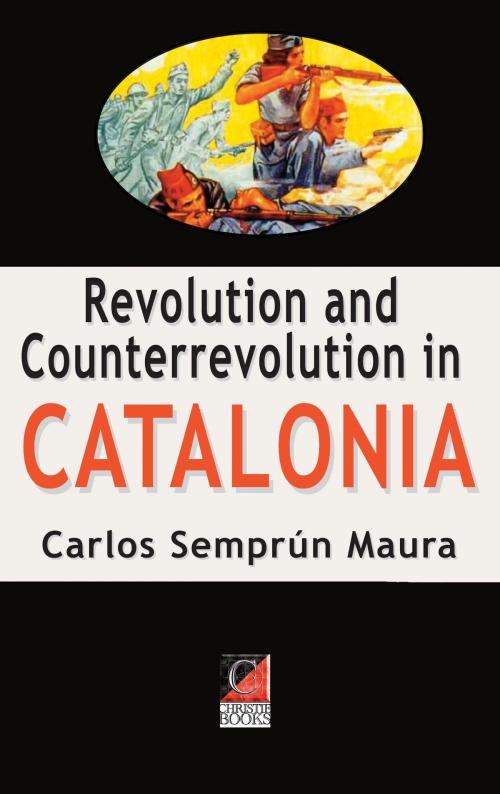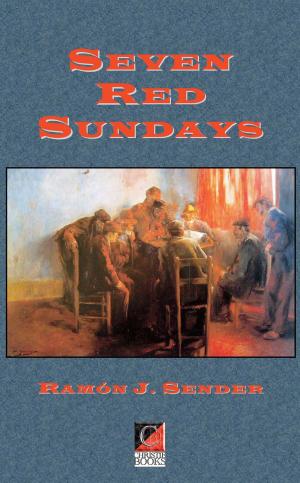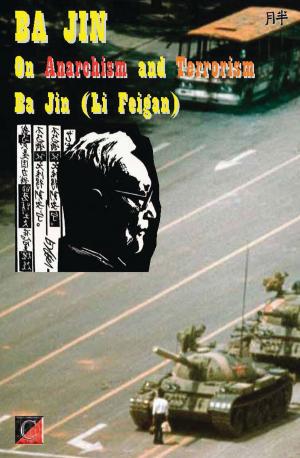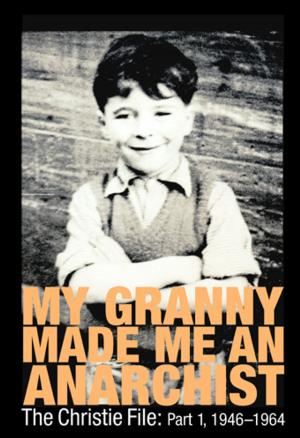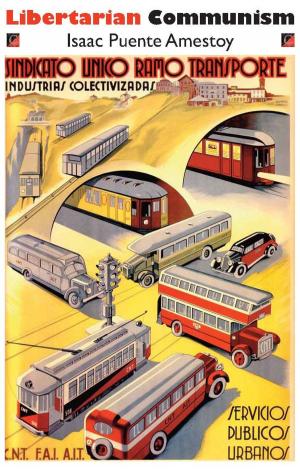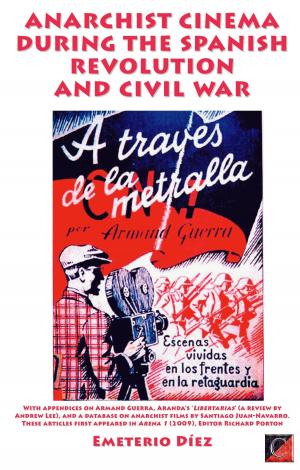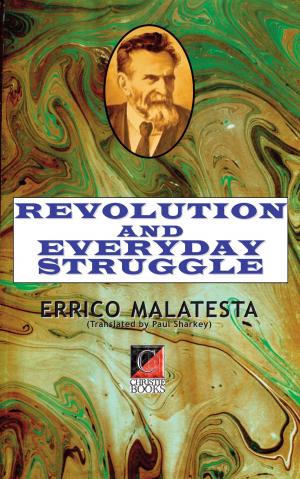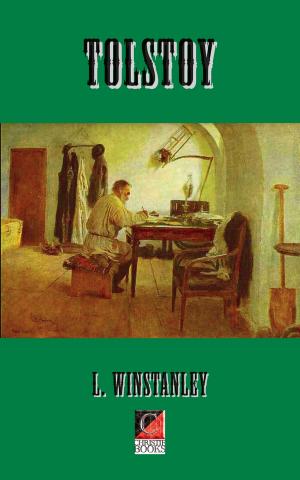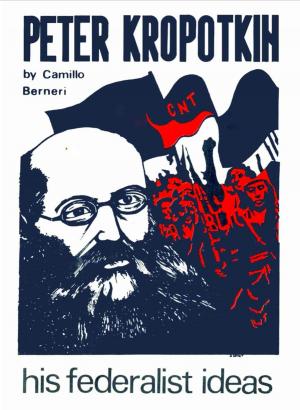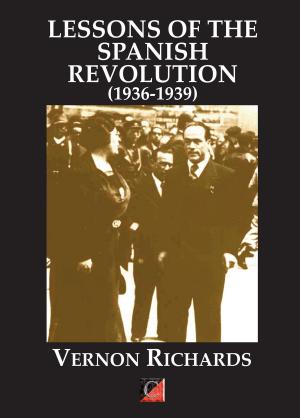REVOLUTION AND COUNTERREVOLUTION IN CATALONIA
Nonfiction, History, Revolutionary, Spain & Portugal, Modern, 20th Century| Author: | Carlos Semprún Maura | ISBN: | 1230000410250 |
| Publisher: | ChristieBooks | Publication: | May 7, 2015 |
| Imprint: | ChristieBooks | Language: | English |
| Author: | Carlos Semprún Maura |
| ISBN: | 1230000410250 |
| Publisher: | ChristieBooks |
| Publication: | May 7, 2015 |
| Imprint: | ChristieBooks |
| Language: | English |
First published in France in 1974 (while still a ‘leftist’), a “critical analysis of the bureaucratization of the CNT, with regard to both the political as well as the economic terrain”, bureaucratization which the author claims was “total and complete”, with discussions of certain historical turning points and watershed moments (e.g., the militarisation of the militias, the May Events and the overthrow of the Council of Aragon), and extensive passages quoted from eyewitness accounts (e.g., Marcel Ollivier’s Les journées sanglantes de Barcelone), newspaper articles and official documents that have not previously appeared in English translation.
“I wrote this book between 1969 and 1971, when the tremors of the May-June 1968 outbreak in France had not yet subsided, and when a wide range of topics, new for many people, nourished actions, discussions, projects, journals and books. Among these topics, of course, were the libertarian revolutions and the shopworn theme of self-management. To me it seemed that the logical as well as the obvious thing to do was to participate in my own way in these discussions and in the critique of totalitarianism (“red” fascism as well as the “white” variety), by writing a book about the experiences of “self-management” in Catalonia and Aragon in 1936-1939, concerning which almost no one (if not absolutely no one) knew anything in France at that time. I was myself only then discovering the importance of these phenomena as I engaged in research and gathered documents and data for the book.
“During those same years, it had become fashionable for Parisian publishers to carry some “leftist” titles in their catalogues, in order to satisfy a new youthful customer base and to thus increase the profits of the various publishing houses.
“This book, however, was offered to a whole series of publishers without being accepted by any of them, until it was to “miraculously” find a home with a respectable, and originally Catholic, publisher (Mame), that was at the time attempting to change its image to keep pace with the times. My book did not bring it any good luck since its publisher went out of business shortly thereafter, sinking into the most total bankruptcy….
“I have changed nothing in the first French edition, except for omitting the short introduction that the French editor had requested in order to shed some light on the question of Catalonian nationalism for any possible readers on the French side of the Pyrenees. Such an introduction may very well be spared the Spanish readers of this book, who can obtain much more complete information on this topic—if they need to do so—from other books, or merely by reading their local newspapers, now that the Generalitat has been reinstated…. I will nonetheless take advantage of this opportunity to say, with regard to that brief review of Catalonian nationalism, that I utterly and completely reject all nationalism.
“I have changed nothing, solely and exclusively due to my laziness, since there is much that could have been revised and improved, and also taking into account the fact that since this book was published, several other volumes have appeared that address the question of the collectives and other themes treated here. I have also refrained from changing the—few—more recent observations contained in the book. For example, the last paragraphs in which, in a quite perfunctory manner, I refer to the situation in Spain at the time when I was writing the book, that is, the situation of Spain under Franco.
“Obviously, no one could have confidently asserted at that time that once Franco had died, Francoism would disappear so rapidly and so peacefully and that the recently unleashed democracy, with a full head of steam, would lead Spain towards Banality. A Banality that was preferable, in my view, to fascism, with or without its Francoist peculiarities. But this does not obviate the fact, and it is important to emphasize this, that revolutionary (you can put quotation marks around the word if you like) hopes and dreams have, with each passing day, fallen by the wayside.
“And this, evidently, would tend to relegate this book to the dustiest shelf of the library, where the history books are stored, that is, books about what happened and will never happen again.
I say this because this book may cause certain readers to suffer from a delusion of “example” and the illusion of “repetition”. Something like the belief that what the libertarian workers set about doing in 1936, that undoubtedly profound social revolution, can be done again today and pursued to its ultimate consequences. Mere delusion, I repeat.
“It is possible that this text will be “guilty” of fomenting illusions of this kind, it is possible that my own enthusiasm, upon discovering the importance of that social revolution, might be confused with something like a “clear and simple perspective for our time”: all we need to do is to pick up where they left off on that glorious road. Alas, no. I have never believed that history can be repeated; even less so with respect to this particular history.
“Of course, no book, despite what the Marxist-Leninists believe, who are always in search of the right program, can provide revolutionary solutions, because everything that has ever been revolutionary in the world is always unpredictable and spontaneous and therefore surpasses and immediately renders obsolete any kind of program. Even if the “Marxist” historians will come later to explain to us that everything happened that way because Lenin was drinking coffee not far from the epicenter of the events.
“If the repetition of what happened in Catalonia in 1936-1937 seems to me to be clearly impossible, this is simply because the Spanish society of today is very different from the Spanish society of 1936. Therefore, the anti-state, anti-authoritarian, libertarian, self-management, etc., struggle (I know full well that such a struggle does not exist today in Spain, we are only talking about a hypothesis), in order to exist, would have to be reinvented from top to bottom.
“An adequate explanation of the changes that have taken place in Spanish society (and in the world) since the civil war, both with regard to attitudes and behaviors, as well as with regard to industry and agriculture, social classes, the role of the State, etc., not to speak of an evaluation of the significance of these changes, would require another book, and such an explanation cannot be encompassed in the framework of an introduction. It would be an easy matter for any reader, however, to compare what took place in 1936, which I relate here in the footsteps of so many others, with what he experiences in his everyday life. They have nothing in common. Apart from the “eternal values” of Liberty and Justice which, precisely because they are “eternal”, are of no interest to me.
“Nonetheless, attempts are being made to repeat history, and not just repeat it, but to make sure that it is repeated in exactly the same way. All the old cemeteries are being excavated. The old cadavers of anarchosyndicalism are disinterred, the old glories dislodged from their holes, the old mummies removed from their sarcophagi, the old flags unfurled and the age-old statutes dusted off, and an attempt is made to carry on with the glorious history of the CNT. And that is what is taking place right now.
“Today’s CNT is nothing but a bad caricature of the CNT of the past. And this is not only logical, but was even predictable. I think that I have shown, in the pages that follow, everything that was contradictory throughout the 1930s in the theory and practice of anarchosyndicalism. Today, however, and precisely as a result of the changes that have since taken place in Spanish society, the very idea of anarchosyndicalism is stillborn, because in societies such as that of Spain, no trade union can be anything but a particular instrument for the integration of the workers into society, a vehicle for the control and management (and therefore one that inhibits action) of discontent and revolt. Exactly the contrary of anarchism, therefore, if this word still has any meaning at all. Which is certainly open to doubt.
“It is true that the “reborn” CNT is today composed of people who, under the very same acronyms [CNT, etc.], understand not just different, but contradictory things. What is most striking, however, about the last few months of activity, at first tolerated and then legal, not taking into account the declarations of good intentions, but only the facts, is the fact that the CNT has been incapable of distinguishing itself in any significant way from the other trade union federations: the struggle for the legacy of the CNS [Centrales Nacionales Sindicales, the authoritarian “vertical” trade union of the Franco regime] calls for amnesty, demonstrations with shouted slogans and waving flags, debates about contracts, etc.—the same eyewash employed by all the bureaucratic organizations. And we shall not speak of that caricature of caricatures, of the sinister happening [in English in the original] of those who are attempting to reestablish the FAI, and in order to do so sleep once a week with a pistol under their pillow and dream that they are Durruti! (A personality who is totally sanctified and concerning whom we will have to start to speak with a minimum of critical spirit.)
“All the expressions of outrage and all the excuses are of no avail against the fact that in conflicts in which something new, different, modern or libertarian has taken place (in Vitoria or Roca, for example), the CNT was absent. It “supported” or applauded the events symbolically, but from afar. In these and in other cases it was the workers themselves who, rejecting the self-interested support and even more the leadership of all parties and trade unions, conducted their struggles democratically by means of sovereign assemblies.
“No, the only thing that is new is the festive spirit, the introduction of the notion of the festival in certain rallies and meetings of the CNT. But however attractive and novel it may be to break with the ritual that made meetings seem like the Catholic mass, two observations are in order: 1) the introduction of the festival in the meeting, of casual “informality” in the holy mass, has now led to scandal and it will not be long before it is expelled from “the ranks of a serious organization like the CNT”; and 2) those who think that these festive manifestations will have even the least effect on the stability of the royal throne or that of the Prime Minister—whether Suárez or González—are in for the biggest disappointment of their lives. It is, of course, true that most of the new “juerguistas” [fun-loving, pleasure-seekers] only want to have a good time and this “why not?” attitude has its place, but it does not go beyond this goal that is itself as important as it is limited.
“To summarize: This book is not a manual in which I explain how to recreate, on the basis of past and present experiences, the libertarian collectives of Aragon, Catalonia—or Extremadura—or the barricades of Barcelona. If it has any interest at all, it is precisely because it can serve to show the enormous distance and the countless differences that separate the Spain of 1936 from the Spain of 1978 and the impossibility of repeating what took place in 1936. If that is what you are looking for, you will have to look elsewhere.
“It might also have a critical interest, however. For me, of course, I would be pleased if it were a well-aimed stone that would shatter the totally false showcase of the Stalinist legend about the period of the civil war. After forty years of Francoist censorship—and of post-Francoist guilty consciences—the Spanish Stalinists have succeeded in imposing a heroic and democratic image of their activity, which was actually totally counterrevolutionary and repressive, during the civil war. Various books have already denounced this mystification (the best one being, probably, Burnett Bolloten’s The Grand Camouflage), but it is not useless to continue to throw stones at the showcase of this lie, if only to see if ours will be the one that breaks it.
“My critique is not limited, however, to the analysis of the Stalinism of the 1930s. I also criticize the activity and conduct of the leading circles of the CNT. Generally, the anarchists who have criticized the actions of the leaders of the CNT (Peirats, Vernon Richards, etc.) have always done so from what we may call a political angle. For example: by joining Governments, the leaders of the CNT betrayed acratic principles; and by accepting the militarization of the militias, they did the same. All of this is true, but the reality is much more serious and profound, and I thought it was important to undertake a critical analysis of the bureaucratization of the CNT, with regard to not just the political, but also the economic terrain, “in the halls of power”, a bureaucratization that, as I think I have proven, was total and complete. And this is also of importance today. For, just what is it that those who are reconstructing the CNT are trying to accomplish? The impossible creation of a “revolutionary” trade union, or the organization of a trade union bureaucracy? The answer is obvious.
“Modern societies are capable of producing a wide array of antibodies, of barriers and illusions around which those who seek to change or destroy those societies clump together, in an “organization” whose task is to plan discontent and then negotiate over it with the State and the employers in the eternal merry-go-round which is the basis of the conflict-ridden integration of the workers into the process of production.
“If there have not been more actions and initiatives under the aegis of acracy over the last few years in Spain, this is because too many groups and individuals have restricted their efforts to the task of rebuilding the Palace of the Thousand and One Nights of anarchosyndicalism, which has been dead since May 1937 (if you want to specify its date of death, which is not even necessary). By dedicating all their time and effort to this illusory task they have not conceived, and are indeed incapable of conceiving, even the least significant new idea. That Palace, which even has many resemblances to the Tower of Babel, has no other “coherence” than that which lies in its past.
“His Majesty’s Government should not forget the CNT when the time comes for granting subsidies to the trade unions (maybe it will even get something from the distribution of the booty of the CNS), for who knows what might have happened if all those who are today devoted to building the Palace of mere nostalgia had instead chosen to think and to act, here and now?”
C.S.M. — Paris, November 1977
First published in France in 1974 (while still a ‘leftist’), a “critical analysis of the bureaucratization of the CNT, with regard to both the political as well as the economic terrain”, bureaucratization which the author claims was “total and complete”, with discussions of certain historical turning points and watershed moments (e.g., the militarisation of the militias, the May Events and the overthrow of the Council of Aragon), and extensive passages quoted from eyewitness accounts (e.g., Marcel Ollivier’s Les journées sanglantes de Barcelone), newspaper articles and official documents that have not previously appeared in English translation.
“I wrote this book between 1969 and 1971, when the tremors of the May-June 1968 outbreak in France had not yet subsided, and when a wide range of topics, new for many people, nourished actions, discussions, projects, journals and books. Among these topics, of course, were the libertarian revolutions and the shopworn theme of self-management. To me it seemed that the logical as well as the obvious thing to do was to participate in my own way in these discussions and in the critique of totalitarianism (“red” fascism as well as the “white” variety), by writing a book about the experiences of “self-management” in Catalonia and Aragon in 1936-1939, concerning which almost no one (if not absolutely no one) knew anything in France at that time. I was myself only then discovering the importance of these phenomena as I engaged in research and gathered documents and data for the book.
“During those same years, it had become fashionable for Parisian publishers to carry some “leftist” titles in their catalogues, in order to satisfy a new youthful customer base and to thus increase the profits of the various publishing houses.
“This book, however, was offered to a whole series of publishers without being accepted by any of them, until it was to “miraculously” find a home with a respectable, and originally Catholic, publisher (Mame), that was at the time attempting to change its image to keep pace with the times. My book did not bring it any good luck since its publisher went out of business shortly thereafter, sinking into the most total bankruptcy….
“I have changed nothing in the first French edition, except for omitting the short introduction that the French editor had requested in order to shed some light on the question of Catalonian nationalism for any possible readers on the French side of the Pyrenees. Such an introduction may very well be spared the Spanish readers of this book, who can obtain much more complete information on this topic—if they need to do so—from other books, or merely by reading their local newspapers, now that the Generalitat has been reinstated…. I will nonetheless take advantage of this opportunity to say, with regard to that brief review of Catalonian nationalism, that I utterly and completely reject all nationalism.
“I have changed nothing, solely and exclusively due to my laziness, since there is much that could have been revised and improved, and also taking into account the fact that since this book was published, several other volumes have appeared that address the question of the collectives and other themes treated here. I have also refrained from changing the—few—more recent observations contained in the book. For example, the last paragraphs in which, in a quite perfunctory manner, I refer to the situation in Spain at the time when I was writing the book, that is, the situation of Spain under Franco.
“Obviously, no one could have confidently asserted at that time that once Franco had died, Francoism would disappear so rapidly and so peacefully and that the recently unleashed democracy, with a full head of steam, would lead Spain towards Banality. A Banality that was preferable, in my view, to fascism, with or without its Francoist peculiarities. But this does not obviate the fact, and it is important to emphasize this, that revolutionary (you can put quotation marks around the word if you like) hopes and dreams have, with each passing day, fallen by the wayside.
“And this, evidently, would tend to relegate this book to the dustiest shelf of the library, where the history books are stored, that is, books about what happened and will never happen again.
I say this because this book may cause certain readers to suffer from a delusion of “example” and the illusion of “repetition”. Something like the belief that what the libertarian workers set about doing in 1936, that undoubtedly profound social revolution, can be done again today and pursued to its ultimate consequences. Mere delusion, I repeat.
“It is possible that this text will be “guilty” of fomenting illusions of this kind, it is possible that my own enthusiasm, upon discovering the importance of that social revolution, might be confused with something like a “clear and simple perspective for our time”: all we need to do is to pick up where they left off on that glorious road. Alas, no. I have never believed that history can be repeated; even less so with respect to this particular history.
“Of course, no book, despite what the Marxist-Leninists believe, who are always in search of the right program, can provide revolutionary solutions, because everything that has ever been revolutionary in the world is always unpredictable and spontaneous and therefore surpasses and immediately renders obsolete any kind of program. Even if the “Marxist” historians will come later to explain to us that everything happened that way because Lenin was drinking coffee not far from the epicenter of the events.
“If the repetition of what happened in Catalonia in 1936-1937 seems to me to be clearly impossible, this is simply because the Spanish society of today is very different from the Spanish society of 1936. Therefore, the anti-state, anti-authoritarian, libertarian, self-management, etc., struggle (I know full well that such a struggle does not exist today in Spain, we are only talking about a hypothesis), in order to exist, would have to be reinvented from top to bottom.
“An adequate explanation of the changes that have taken place in Spanish society (and in the world) since the civil war, both with regard to attitudes and behaviors, as well as with regard to industry and agriculture, social classes, the role of the State, etc., not to speak of an evaluation of the significance of these changes, would require another book, and such an explanation cannot be encompassed in the framework of an introduction. It would be an easy matter for any reader, however, to compare what took place in 1936, which I relate here in the footsteps of so many others, with what he experiences in his everyday life. They have nothing in common. Apart from the “eternal values” of Liberty and Justice which, precisely because they are “eternal”, are of no interest to me.
“Nonetheless, attempts are being made to repeat history, and not just repeat it, but to make sure that it is repeated in exactly the same way. All the old cemeteries are being excavated. The old cadavers of anarchosyndicalism are disinterred, the old glories dislodged from their holes, the old mummies removed from their sarcophagi, the old flags unfurled and the age-old statutes dusted off, and an attempt is made to carry on with the glorious history of the CNT. And that is what is taking place right now.
“Today’s CNT is nothing but a bad caricature of the CNT of the past. And this is not only logical, but was even predictable. I think that I have shown, in the pages that follow, everything that was contradictory throughout the 1930s in the theory and practice of anarchosyndicalism. Today, however, and precisely as a result of the changes that have since taken place in Spanish society, the very idea of anarchosyndicalism is stillborn, because in societies such as that of Spain, no trade union can be anything but a particular instrument for the integration of the workers into society, a vehicle for the control and management (and therefore one that inhibits action) of discontent and revolt. Exactly the contrary of anarchism, therefore, if this word still has any meaning at all. Which is certainly open to doubt.
“It is true that the “reborn” CNT is today composed of people who, under the very same acronyms [CNT, etc.], understand not just different, but contradictory things. What is most striking, however, about the last few months of activity, at first tolerated and then legal, not taking into account the declarations of good intentions, but only the facts, is the fact that the CNT has been incapable of distinguishing itself in any significant way from the other trade union federations: the struggle for the legacy of the CNS [Centrales Nacionales Sindicales, the authoritarian “vertical” trade union of the Franco regime] calls for amnesty, demonstrations with shouted slogans and waving flags, debates about contracts, etc.—the same eyewash employed by all the bureaucratic organizations. And we shall not speak of that caricature of caricatures, of the sinister happening [in English in the original] of those who are attempting to reestablish the FAI, and in order to do so sleep once a week with a pistol under their pillow and dream that they are Durruti! (A personality who is totally sanctified and concerning whom we will have to start to speak with a minimum of critical spirit.)
“All the expressions of outrage and all the excuses are of no avail against the fact that in conflicts in which something new, different, modern or libertarian has taken place (in Vitoria or Roca, for example), the CNT was absent. It “supported” or applauded the events symbolically, but from afar. In these and in other cases it was the workers themselves who, rejecting the self-interested support and even more the leadership of all parties and trade unions, conducted their struggles democratically by means of sovereign assemblies.
“No, the only thing that is new is the festive spirit, the introduction of the notion of the festival in certain rallies and meetings of the CNT. But however attractive and novel it may be to break with the ritual that made meetings seem like the Catholic mass, two observations are in order: 1) the introduction of the festival in the meeting, of casual “informality” in the holy mass, has now led to scandal and it will not be long before it is expelled from “the ranks of a serious organization like the CNT”; and 2) those who think that these festive manifestations will have even the least effect on the stability of the royal throne or that of the Prime Minister—whether Suárez or González—are in for the biggest disappointment of their lives. It is, of course, true that most of the new “juerguistas” [fun-loving, pleasure-seekers] only want to have a good time and this “why not?” attitude has its place, but it does not go beyond this goal that is itself as important as it is limited.
“To summarize: This book is not a manual in which I explain how to recreate, on the basis of past and present experiences, the libertarian collectives of Aragon, Catalonia—or Extremadura—or the barricades of Barcelona. If it has any interest at all, it is precisely because it can serve to show the enormous distance and the countless differences that separate the Spain of 1936 from the Spain of 1978 and the impossibility of repeating what took place in 1936. If that is what you are looking for, you will have to look elsewhere.
“It might also have a critical interest, however. For me, of course, I would be pleased if it were a well-aimed stone that would shatter the totally false showcase of the Stalinist legend about the period of the civil war. After forty years of Francoist censorship—and of post-Francoist guilty consciences—the Spanish Stalinists have succeeded in imposing a heroic and democratic image of their activity, which was actually totally counterrevolutionary and repressive, during the civil war. Various books have already denounced this mystification (the best one being, probably, Burnett Bolloten’s The Grand Camouflage), but it is not useless to continue to throw stones at the showcase of this lie, if only to see if ours will be the one that breaks it.
“My critique is not limited, however, to the analysis of the Stalinism of the 1930s. I also criticize the activity and conduct of the leading circles of the CNT. Generally, the anarchists who have criticized the actions of the leaders of the CNT (Peirats, Vernon Richards, etc.) have always done so from what we may call a political angle. For example: by joining Governments, the leaders of the CNT betrayed acratic principles; and by accepting the militarization of the militias, they did the same. All of this is true, but the reality is much more serious and profound, and I thought it was important to undertake a critical analysis of the bureaucratization of the CNT, with regard to not just the political, but also the economic terrain, “in the halls of power”, a bureaucratization that, as I think I have proven, was total and complete. And this is also of importance today. For, just what is it that those who are reconstructing the CNT are trying to accomplish? The impossible creation of a “revolutionary” trade union, or the organization of a trade union bureaucracy? The answer is obvious.
“Modern societies are capable of producing a wide array of antibodies, of barriers and illusions around which those who seek to change or destroy those societies clump together, in an “organization” whose task is to plan discontent and then negotiate over it with the State and the employers in the eternal merry-go-round which is the basis of the conflict-ridden integration of the workers into the process of production.
“If there have not been more actions and initiatives under the aegis of acracy over the last few years in Spain, this is because too many groups and individuals have restricted their efforts to the task of rebuilding the Palace of the Thousand and One Nights of anarchosyndicalism, which has been dead since May 1937 (if you want to specify its date of death, which is not even necessary). By dedicating all their time and effort to this illusory task they have not conceived, and are indeed incapable of conceiving, even the least significant new idea. That Palace, which even has many resemblances to the Tower of Babel, has no other “coherence” than that which lies in its past.
“His Majesty’s Government should not forget the CNT when the time comes for granting subsidies to the trade unions (maybe it will even get something from the distribution of the booty of the CNS), for who knows what might have happened if all those who are today devoted to building the Palace of mere nostalgia had instead chosen to think and to act, here and now?”
C.S.M. — Paris, November 1977
